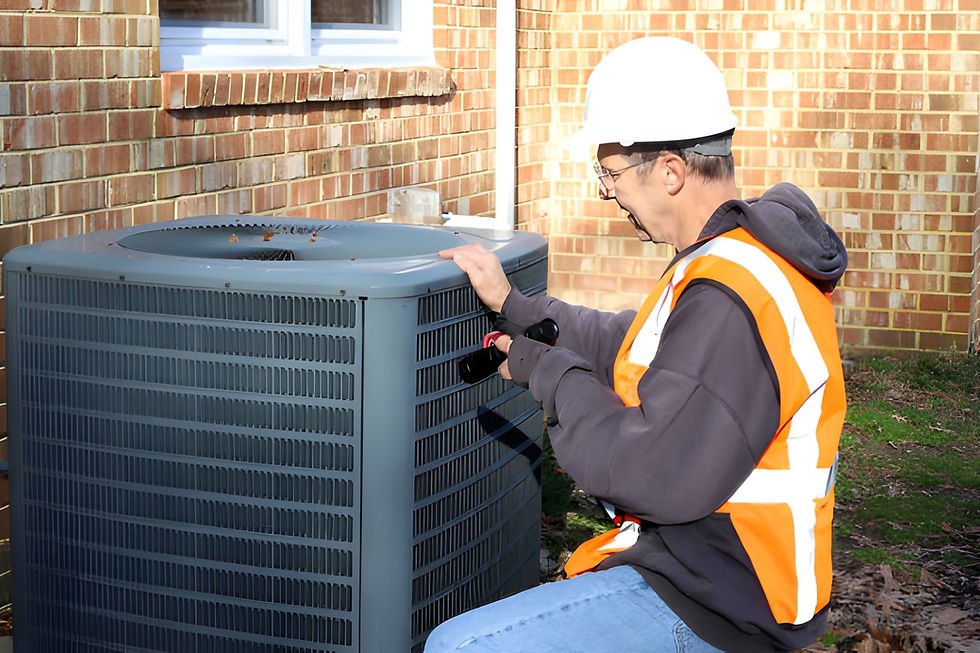Fixing a Blown Fuse or Tripped Breaker | For Saving HVAC
- For Saving
- May 22, 2025
- 4 min read
Blown fuses and tripped breakers are more common than you think—especially when your air conditioner or furnace draws too much power. At For Saving HVAC, we help GTA homeowners stay safe and cool by identifying whether the issue is electrical, HVAC-related, or both. If your system constantly trips breakers, don’t ignore the signs—know what to check, and when to call us in.
Even more importantly, understanding how electrical problems relate to your HVAC system can help you avoid system failures, expensive repairs, or even potential hazards. This guide walks you through the step-by-step process of diagnosing and fixing these common problems—and when to call an expert.

Why Fuses and Breakers Are Important for Home Safety
Fuses and circuit breakers are installed to interrupt the flow of electricity when there’s too much current running through a circuit. This protects your wiring, appliances, and HVAC equipment from overheating or starting a fire.
Homeowners with HVAC systems in Greater Toronto are especially prone to these issues during peak seasons when air conditioners and furnaces are running more frequently. Sudden spikes in usage can cause overloads, particularly in homes with older electrical panels or outdated fuse boxes.
Common Causes of a Blown Fuse or Tripped Breaker
There are a few primary reasons your system may trip or blow:
Circuit Overload: Plugging multiple high-draw appliances—like an air conditioner, microwave, and vacuum—into a single circuit.
Short Circuit: Happens when a hot wire touches a neutral or ground wire, causing a surge.
Ground Fault: Similar to a short circuit, but occurs when a hot wire touches a grounded object (like a metal box or appliance casing).
Arc Fault: Often caused by damaged wiring. This can be common in older homes across Markham and should be evaluated immediately.
In HVAC Markham homes, overloaded circuits are often triggered by aging air conditioners or electric furnaces drawing more current than intended.
How to Identify the Problem
Here are some signs you may be dealing with a blown fuse or tripped breaker:
One room or area of your home suddenly loses power
Lights dim or flicker before turning off
Your AC or furnace shuts down without warning
The breaker switch has flipped to the "middle" or "off" position
A fuse appears blackened, or the metal inside is visibly melted
If your HVAC system is involved—for example, your AC won’t restart after a brief power loss—it’s likely tied to the circuit connected to that equipment.

Step-by-Step: Resetting a Tripped Breaker
Find Your Electrical Panel: Usually in the basement, garage, or utility room.
Identify the Tripped Breaker: It will be the one stuck between ON and OFF or fully OFF.
Turn Off Affected Devices: Switch off any lights or unplug devices on that circuit.
Flip the Breaker Fully Off, Then On: This resets the circuit.
Monitor the System: If the breaker trips again, don’t force it—there may be a deeper issue that needs an electrician or HVAC Greater Toronto technician.
Step-by-Step: Replacing a Blown Fuse
Turn Off Main Power: Shut down all electricity to prevent shock.
Identify the Blown Fuse: Look for a discolored glass window or melted filament.
Remove the Fuse Carefully: Use insulated gloves if possible.
Insert a New Fuse: Make sure the amperage matches exactly.
Restore Power and Test: Check whether the circuit holds. If not, there may be a short somewhere that requires professional help.
Never replace a fuse with one rated for a higher amperage—it’s a serious fire risk.
When to Call a Licensed Technician
If your breaker trips or your fuse blows repeatedly, it’s time to bring in a professional. There may be a deeper issue involving your home’s wiring or HVAC system.
At For Saving Home Services Inc., we often find that Greater Toronto homeowners experience breaker trips when an HVAC system is pulling more power than their panel can handle—especially with aging air conditioners or undersized circuits.
You should also call for help if:
You smell burning or see burn marks near your panel
You feel unsure about safely replacing a fuse
Your HVAC system won’t turn back on after resetting power
Your electrical panel hasn’t been updated in over 20 years
Why Your HVAC System Might Be to Blame
Your air conditioner and furnace are among the most energy-demanding appliances in your home. If they’re drawing more power than your panel can deliver, it creates an ongoing electrical strain.
In HVAC installations Markham, we frequently upgrade both the electrical panel and the cooling system at the same time—ensuring not just cooling comfort but electrical safety too. If your system frequently shuts off or trips the breaker when it starts, it may be time for both HVAC and electrical inspections.
Electrical Panel Upgrades in HVAC Greater Toronto Projects
As part of our full-service offering, we often recommend panel upgrades to clients replacing their HVAC systems. Why? Because installing a new high-efficiency AC or furnace on an outdated electrical system may lead to ongoing breaker trips and fire hazards.
If you’re planning a new HVAC installation in Greater Toronto, ask about:
Electrical panel capacity checks
Dedicated breaker lines for HVAC systems
Smart breaker panels for surge detection
Final Thoughts: Safety First
Blown fuses and tripped breakers are more than just inconveniences—they're signs that your home’s electrical system is protecting you from a serious risk. Knowing how to reset a breaker or replace a fuse is part of responsible homeownership, especially in Ontario’s diverse housing market.
Breaker still tripping when your HVAC system kicks in? Contact For Saving HVAC for same-day service in Markham and across the GTA. Book your inspection now.




Comments